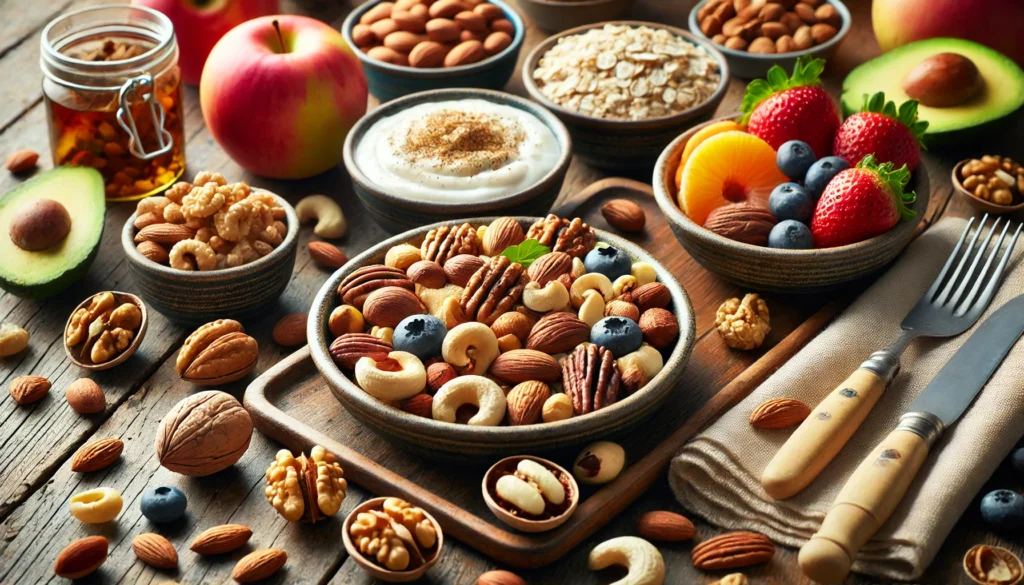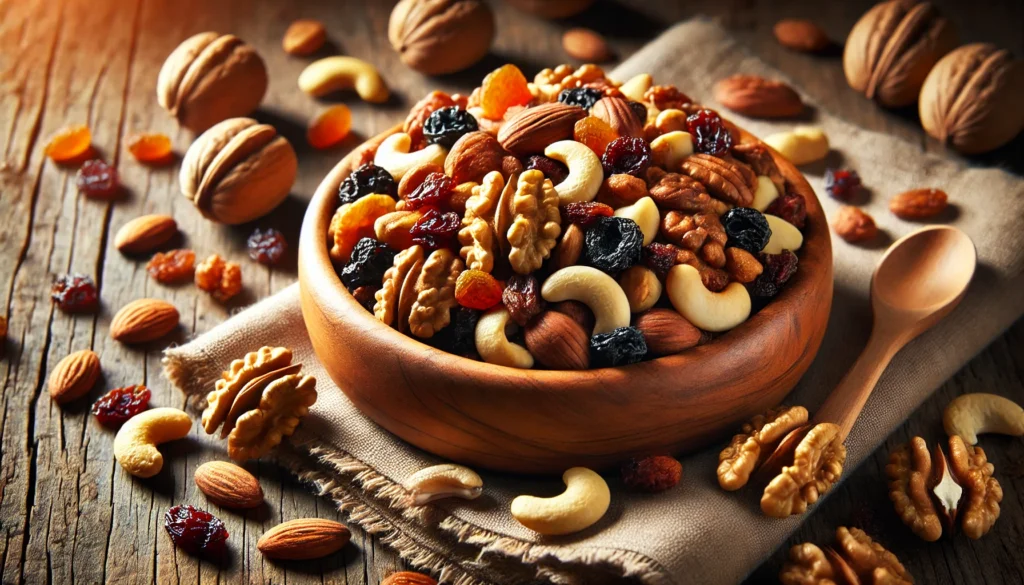The brain is a complex organ. It requires a variety of nutrients to function optimally.
One way to support brain health is through diet. Certain foods are known to be particularly beneficial for the brain.
Among these, nuts stand out. They are packed with nutrients that can enhance brain function.
In this article, we will explore the top 5 nuts for brain health. We will delve into the science behind their benefits.
We will discuss walnuts, almonds, cashews, Brazil nuts, and pecans. Each of these nuts offers unique benefits for the brain.
We will also provide practical advice on how to incorporate these nuts into your diet. This will help you reap their brain-boosting benefits.
Whether you’re a health coach, a science journalist, or a biohacker, this article is for you. It aims to provide comprehensive, scientifically-backed information on the best nuts for brain health.
So, let’s embark on this journey to discover the top 5 nuts for brain health. Let’s learn how to nourish our brains with these nutritional powerhouses.
You may also like: Top Foods to Enhance Your Memory
The Nutritional Powerhouse of Nuts for Brain Health
Nuts are a nutritional powerhouse. They are packed with healthy fats, protein, and fiber. These components make nuts an excellent choice for brain health.
Essential nutrients found in nuts support cognitive functions. These include omega-3 fatty acids, vitamin E, magnesium, and selenium. Each of these nutrients plays a role in brain function and protection.
Scientific studies have consistently shown a connection between nut consumption and cognitive benefits. These benefits include improved memory, better learning, and a lower risk of cognitive decline.
Here are some key nutrients in nuts that support brain health:
- Omega-3 fatty acids: Found in walnuts, these fats help in brain cell communication.
- Vitamin E: Abundant in almonds and hazelnuts, it helps in protecting brain cells from oxidative stress.
- Magnesium: Present in cashews, it assists in memory and learning capabilities.
- Selenium: Found in Brazil nuts, it’s crucial for cognitive functions and fighting neurodegeneration.
- Antioxidants: Pecans are rich in antioxidants, which help combat oxidative damage to brain cells.
Regular nut consumption is associated with a lower risk of cognitive impairment. Additionally, nuts have anti-inflammatory properties that protect against neuroinflammation. These anti-inflammatory effects contribute to the overall brain health of those who incorporate nuts into their diets. As you include nuts in your meals, consider their broad spectrum of benefits beyond just taste and texture.
Walnuts: The Omega-3 Rich Brain Booster
Walnuts are often called brain food, and for good reason. They are a rich source of alpha-linolenic acid (ALA). ALA is a plant-based omega-3 fatty acid crucial for brain function.
Omega-3 fatty acids in walnuts are vital for maintaining the structural integrity of brain cells. They help improve brain signaling and neurotransmitter pathways. This can lead to enhanced cognitive function and mood stability.
Walnuts are also high in antioxidants. These include polyphenols, which can reduce oxidative stress in the brain. This reduction in stress helps protect brain cells from damage.
The anti-inflammatory properties of walnuts further support brain health. By reducing inflammation, walnuts can improve brain resilience and cognitive flexibility.
Research has shown that walnuts may improve memory and learning. They can enhance brain plasticity, allowing for better adaptation and learning.
Walnuts also contribute to heart health. Improved heart health indirectly benefits brain function by promoting better blood flow to the brain.
Including walnuts in your diet can be simple. Enjoy them as a snack, sprinkle them over salads, or blend them into smoothies. Incorporating walnuts regularly can provide lasting cognitive benefits.

Almonds: Vitamin E and Brain Protection
Almonds are another nut known for their brain-boosting properties. They are particularly rich in vitamin E, a powerful antioxidant. Vitamin E plays a crucial role in protecting brain cells from oxidative damage.
Almonds also contain riboflavin and L-carnitine. These nutrients have been shown to positively affect brain activity. They help improve memory retention and cognitive performance.
Regular almond consumption is linked with a reduced risk of cognitive decline. This is particularly true for older adults, who often face age-related memory issues.
Almonds help in maintaining healthy cholesterol levels. This can lead to improved heart health and, consequently, better brain function.
The high magnesium content in almonds supports memory and learning. Magnesium is vital for neurotransmitter balance and brain cell communication.
Including almonds in your diet is easy. Enjoy them raw or roasted, add them to yogurt, or blend them into almond butter.
By incorporating almonds, you are not only enjoying a delicious snack but also supporting your brain health. This small dietary change can have a significant impact over time.
Cashews: Magnesium for Memory and Learning
Cashews are not only creamy and delicious but also packed with brain-boosting nutrients. One standout nutrient in cashews is magnesium. This mineral is essential for brain health and cognitive functions.
Magnesium plays a vital role in synaptic plasticity, which supports memory and learning. It helps in neurotransmitter release and brain cell communication. This can enhance cognitive processing and focus.
Cashews also provide a good amount of iron and zinc. Iron is crucial for oxygenating brain cells, while zinc supports neurotransmitter function.
Regular consumption of cashews may lead to improved mood and reduced anxiety. This is due in part to their magnesium content, which helps regulate stress hormone levels.
Cashews are versatile in their culinary uses. Use them in stir-fries, add them to trail mixes, or blend them into creamy sauces.
Including cashews in your diet can also contribute to improved heart health. This is beneficial for brain health as proper blood flow supports cognitive function.
By incorporating cashews, you are providing your brain with essential nutrients. These nutrients help support memory, learning, and overall cognitive health.
Brazil Nuts: Selenium’s Role in Cognitive Function
Brazil nuts are unique among nuts for their high selenium content. Selenium is a trace mineral that plays a crucial role in cognitive function and protection against neurodegeneration.
Selenium acts as a powerful antioxidant in the brain. It helps prevent cellular damage and supports the brain’s detoxification processes.
Regular consumption of Brazil nuts has been associated with improved cognitive function. This is largely due to selenium’s role in reducing oxidative stress in the brain.
Selenium also supports neurogenesis, the formation of new brain cells. This process is vital for maintaining cognitive health as we age.
A single Brazil nut can provide your daily selenium requirement. This makes them an efficient and powerful addition to your diet.
Incorporating Brazil nuts is simple. Enjoy them raw, add them to trail mixes, or include them in baked goods for a healthy treat.
By adding Brazil nuts to your diet, you are supporting your brain’s health. This nut provides critical nutrients that help maintain cognitive function and protect the brain from damage.
Pecans: Antioxidants and Brain Health
Pecans are another great nut for brain health, rich in antioxidants. These antioxidants help combat oxidative stress in the brain, protecting cells from damage.
The antioxidants in pecans include polyphenols, which have neuroprotective effects. These effects can contribute to improved brain function and cognitive health.
Pecans also support heart health, which indirectly benefits brain function. A healthy heart ensures better blood flow to the brain, supporting cognitive processes.
Regular consumption of pecans has been linked with a reduction in oxidative markers. This leads to healthier brain function and a lower risk of cognitive decline.
Pecans can be enjoyed in various ways. Add them to salads, incorporate them into baked goods, or snack on them raw.
Including pecans in a balanced diet can enhance your cognitive health. This small addition can have lasting benefits for your brain.
By choosing pecans, you are not only enjoying a tasty snack. You are also helping to protect and nourish your brain with powerful antioxidants.

Incorporating Brain-Healthy Nuts into Your Diet
Integrating nuts into your diet can be both simple and delicious. Nuts are versatile, adding flavor and nutrients to many meals.
Here are some ways to incorporate nuts into your daily routine:
- Breakfast: Sprinkle nuts on oatmeal or yogurt.
- Snacks: Enjoy a handful of mixed nuts as a mid-day boost.
- Lunch: Add chopped nuts to salads for texture.
- Dinner: Use nuts in sauces or as a crust for meats.
- Desserts: Include nuts in baked goods or homemade granola bars.
These small additions can make a big difference in supporting brain health through nutrition.
Moderation and Mindful Eating: The Key to Benefiting from Nuts
While nuts are nutrient-dense, moderation is key to maximizing their benefits. Their high-calorie content means portion control is important.
Mindful eating can enhance your experience with nuts. Pay attention to taste, texture, and portion sizes.
Enjoy nuts slowly, savoring each bite. This not only increases satisfaction but also helps prevent overindulgence.
Balancing nuts with other nutrient-rich foods amplifies their brain-boosting effects. Together, they contribute to a diet that supports overall cognitive health.
By being mindful and moderate, you ensure that nuts contribute positively to your health without unwanted weight gain.
The Broader Impact of Nuts on Overall Health
Nuts don’t just benefit the brain; they enhance overall wellness. Packed with healthy fats, nuts support various bodily functions. Regular nut consumption can aid in weight management, thanks to their satisfying nature.
Their rich nutrient profile also aids metabolism. Essential minerals found in nuts promote bone health and cellular function, demonstrating their comprehensive health advantages.
Heart Health and Blood Flow to the Brain
Nuts are renowned for promoting heart health. The unsaturated fats in nuts help lower bad cholesterol. This reduces the risk of heart disease, ensuring a healthier heart.
A healthy heart pumps blood efficiently, nourishing the brain. Improved blood flow enhances oxygen delivery, supporting cognitive function and vitality.
Anti-Inflammatory Effects and Neuroprotection
The anti-inflammatory properties of nuts are well-documented. Nuts contain polyphenols, powerful compounds that reduce inflammation in the body.
This reduction is crucial for the brain, where inflammation can impair function. Consistent nut consumption offers neuroprotective benefits, shielding the brain from oxidative stress and potential damage.
Nuts and the Mind: Mood, Stress, and Mental Health
Nuts are more than just physical health boosters; they are mental health allies too. Nutrients in nuts like magnesium and zinc play a crucial role in neurotransmitter function. These functions can influence mood and reduce symptoms of anxiety and depression.
Nuts can also help manage stress. High levels of antioxidants and anti-inflammatory agents in nuts combat stress-induced damage. Regular consumption can foster a stable mood and improve overall mental well-being. Integrating nuts into your diet may support emotional resilience and cognitive clarity.
The Future of Nuts in Brain Health Research
The horizon for nut research is promising and expansive. Scientists are delving deeper into how nuts affect brain function on a molecular level. Emerging studies suggest potential links between nut intake and reduced risk of neurodegenerative diseases.
Innovations in nut processing may enhance nutrient bioavailability, maximizing brain benefits. Researchers are also exploring genetic factors that influence an individual’s response to nuts. As technology advances, we anticipate groundbreaking insights into personalized nutrition. This could transform dietary recommendations for cognitive longevity and overall brain health.

Conclusion: Embracing Nuts as Part of a Brain-Healthy Lifestyle
Incorporating nuts into your diet is a simple yet effective step towards enhancing brain health. Their rich nutrient profiles offer multiple cognitive benefits that can support mental acuity and well-being.
As part of a balanced diet, nuts contribute more than just brain benefits. They promote heart health, reduce inflammation, and stabilize mood. By choosing a variety of nuts and consuming them mindfully, you can enjoy their full spectrum of health benefits. Embrace nuts as allies in your journey towards a healthier brain and lifestyle.
Further Reading:
15 “Brain Foods” That May Help Preserve Your Memory
Beneficial Effects of Walnuts on Cognition and Brain Health
Important Note: The information contained in this article is for general informational purposes only, and should not be construed as health or medical advice, nor is it intended to diagnose, prevent, treat, or cure any disease or health condition. Before embarking on any diet, fitness regimen, or program of nutritional supplementation, it is advisable to consult your healthcare professional in order to determine its safety and probable efficacy in terms of your individual state of health.
Regarding Nutritional Supplements Or Other Non-Prescription Health Products: If any nutritional supplements or other non-prescription health products are mentioned in the foregoing article, any claims or statements made about them have not been evaluated by the U.S. Food and Drug Administration, and such nutritional supplements or other health products are not intended to diagnose, treat, cure, or prevent any disease.


